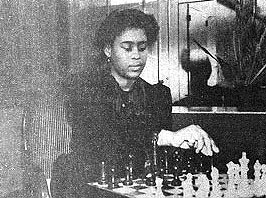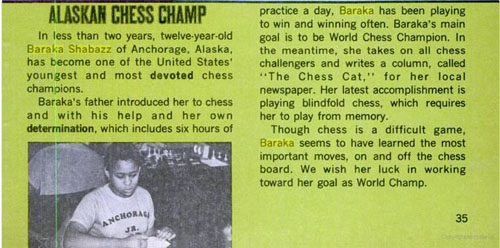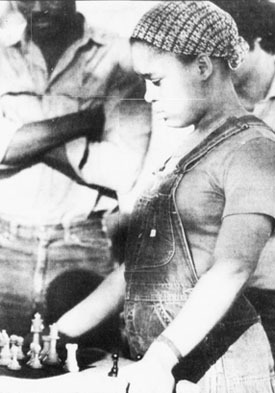Baraka Shabazz: Black Queen of Chess

Baraka Shabazz’s demure pose is a testament to her confidence and poise.
This photo was featured in Chicago Metro News, December 4, 1982
as part of Tony Brown Journal segment.
Baraka Shabazz (pronounced ba-roka sha-boz) is a famous name is Black chess lore and a name that exudes power. Her arrival on the scene was as sudden as light shedding darkness, but as fast as she rose, she tumbled into obscurity and disappeared. Baraka’s story is so common of young talents who either become disenchanted, lose interest or simply focus on other activities. In Baraka’s case, perhaps it was the prospects of a bright future and initial success that may have blinded her.
Originally born in Denver, Colorado, Baraka spent her early years in Anchorage, Alaska, with her stepfather Yusef Shabazz and mother Raqiba Shabazz. Mr. Shabazz bought a chess set for the family and taught his children the moves (December 22, 1977). Baraka showed glimmers of talent. It wasn’t long before she began beating her stepfather. In an interview, her mother noted, “Who ever heard of a black girl playing chess?”
Here is the story as Baraka told it in a 1981 interview in The Spokeman,
“He went out and bought us a chess set,” Baraka recalls, “and he gave it to my sister and me and said, “Here, play chess.” We told him, “We don’t know how to play,” so he showed us how the pieces work and said, ‘You have to get your opponent’s king,’ and that was the first time I played. Six weeks after February 16, 1978, I entered my first chess tournament and won three games out of five.”

Baraka Shabazz featured in “Ebony Jr.” magazine (November 1979)
At that point, the parents Raqiba and Yusef decided to afford her the best opportunities to excel at chess. The initial efforts bore fruit as she began her assault on chess competition and three years, she became one of the top female players in the country at age 15.
Baraka was also the first female player of African descent to reach the rank of “Expert” or a 2000 rating in the U.S. Chess Federation system. Many supporters chipped in including a private tutor.
According to a 1981 People magazine article,
…Oakland Mayor Lionel Wilson has paid the Shabazzes’ rent bill from a community fund, and others—including a black-owned travel agency and entertainer Eartha Kitt—have donated money and services so Baraka can compete in distant tournaments.
Reflecting on future plans, “I’ll have time for friends, travel, college. Maybe I’ll be a diplomat. I’ve been taught you go after what you want—I want to be a symbol of achievement for blacks. I’ll make it, you’ll see.” The family made further sacrifices and after two years in California, the family moved to the “Mecca” of U.S. chess, the east coast. There the family settled in the Baltimore area. Here she gained her legend in Dupont Circle. Baraka originally had to overcome sexism and men taking her lightly.
Opponents blew smoke in her face. In another case, a 17-year old boy looked at Baraka and told his mother, “You won’t have to wait for me, I’ll be back in half an hour.” Baraka dragged the game out for hours and hit him with a tactical shot winning the queen. The boy swept the pieces off the board. Success was coming for Baraka and she was indeed living up to her name which means “blessed.”

Baraka Shabazz at Dupont Circle.
There were some rumours that her stepfather was overbearing and especially harsh when Baraka lost. National Master Charles Covington reflected on his stint as a trainer for Baraka. During training games, Mr. Shabazz would be watching carefully and was very critical of her. Covington also mentioned that the stepfather would scold her when he suspected she was not focused. Assessing the situation, Covington admitted to being an easier opponent to avoid contributing to her humiliation.
Baraka got an invitation to play in the 1981 U.S. Women’s Championship and was #6 ranked player. Alexey Rudolph, now Dr. Alexey Root, was also in that tournament and told The Chess Drum both she and Baraka were the youngest in the tournament. Root was another rising talent and won their individual encounter. Baraka came in an abysmal last place.
After that setback, the family hit hard times resulting in the family having to receive public assistance housing in Maryland’s Prince Georges County. According to the article in Jet magazine (December 17, 1981), the family’s case was taken up by Delta Sigma Theta’s Dr. Grace Hewell who charged, “this wouldn’t have happened to a Black who can sing, dance or excel in sports.”
It was a sordid ending to a bright moment in history. No one knows the current whereabouts of Baraka Shabazz, but Covington has gone on record to say that she became disenchanted and wanted nothing more to do with the game. However, Baraka’s story is one that is important to know. She was a young talent with promise, but did not have the proper combination of resources to help realize her talent.
Baraka will go down as a historic figure in Black chess. Her drive is inspiring, but the story contains many lessons for the ages. She stated that she wanted to be a symbol of achievement for Blacks. While she never became a World Champion, or reached Master level, she certainly accomplished her goal. The chess community commends Baraka’s efforts as one of the first female prodigies in U.S. history.
Martha Wilheim, “Her Folks Pawned Everything to Help Baraka Shabazz Become Chess’s Female Bobby Fischer,” People, 9 February 1981.
Joseph McLellan, “Young Chess Player Zooming to the Top,” The Spokesman-Review, 26 June 1981, 17.
Simeon Booker, “Ticker Tape USA“, Ebony Jr., 17 December 1981, 13.

This Article is wonderful! It also helps parents to realize that our children are precious “jewels”. Possible movie in the making! “SEARCHING FOR BARAKA SHABAZZ”. Congrats to Brianna Conley (11th Grader) and Diamond Abdus-Shakoor (3rd Grader) two African American females in Columbus, Ohio; they tied for 2nd place overall this past weekend in the State of Ohio 2010 All Girls Chess Championships! Over 100 girls competed and they were the only two African Americans in the Open Division. They also were two of only four girls who attend the 2009 Polgar Invite. Let’s learn from what Baraka’s parents had to go through! Socioeconomic status should not prevent talent from attending and competing in National or Distance Tournaments. Thanks to the Chess Drum!!!
Congratulations to the East Columbus Elementary Girls Chess Team in Columbus, Ohio. On February 20, 2010 they competed against 11 schools in the Ohio All Girls Chess Championships. The girls tied for 2nd in the State (Runner-up) in the K-6 Unrated Division at their first Tournament ever! This is a public school and Diamond is happy to play with 15 of her girlfriends and travel. Great Job Ladies! There are many more Baraka Shabazz’s out there; the adults must find them, respect them, and nurture them properly!!!
PEACE Proper Education Always Corrects Errors!
Dear Daaim:
Baraka Shabazz is a metaphor for so many African American talents whose dreams were deferred. Presently, we don’t have any African American Grandmasters or African American women who have reached the master level born in the United States. The USCF records me winning 7 National Championships but the last one was the All Girls National Championships in Dallas Texas where 3 girls won the under/12 Championships. Their sponsors were the Harlem Children’s Zone whose chess program I direct could boast that the top girls under the age of 12 in the nation live in Harlem. Derrick Bryant the assistant to the program invited Medina Parilla to compete with us and she won the whole tournament and received a $50,000 scholarship to the University of Texas. In 2008 the Harlem Children’s Zone held the biggest Chess festival in Harlem history and invited Garry Kasparov to play a simul and the last one standing was an 8th-grade African American girl by the name of Rochelle Ballantyne whose rating is over 1900. I interviewed Kasparov after the simul and he said Rochelle was his toughest and not just longest game. Prominent African American female talent such as Darrian Miles, Rochelle Ballantyne and Medina Parilla will know of Baraka Shabazz a trailblazer who came before them.
Chess Director
Jerald Times
HCZ
I saw this link from chesscafe.com and was surprised at its unfinished ending, rather than finding that she is now a schoolteacher or computer programmer and either teaches chess or wants nothing to do with it and changed her name. Good luck in finding that ending.
I started playing chess in my teens and played a couple of USCF tournaments in the late 70’s in N. California so I had seen the name before without knowing much about her (she was probably playing Open and me Reserve so I didn’t even recall what she looked like) or following her later career.
Jerald,
Thanks for the historical data. I didn’t know that your program was so successful. Keep up the good work, young Black men need you as a role model. Because you understand their struggle, and as a Black man can give them direction, not only in chess. So, the next question will must be: who will be the first Black grandmaster born in the U.S? GM Ashley wasn’t born in the U.S. Nevertheless, he is the first African American Grand Master.
Daaim,
I didn’t fall into the nationality trap. We are Africans….. I am on your site for about 4 hours now stealing information about Black history(: I’ll of course give you credit. Writing an article about Black history for my contact list.
Peace Brother Shabazz,
This story on Baraka Shabazz is wonderful; how can we purchase a copy of the DVD to view and/or save in our chess archives! How old is Ms. Shabazz; has any heard from her recently. Thanks for doing a wonderful job with the Chess Drum; Diamond and I are looking forward to meeting you someday in the future; lord willing!
Peace,
The Shakoor Family
I grew up in Anchorage and knew Baraka, not very personally but we were often at the Anchorage Chess Club together. She was a much better player than I was but often seemed unhappy and tense. I think that the pressure of expectation on her was heavy. There’s a lot we could learn about encouraging and supporting young people without burdening or overwhelming them. I have to say, I wasn’t surprised to hear that when she became an independent adult she gave up chess.
Wherever she is now, I hope she is well and happy.
I knew Baraka in the late 80’s we were roommates for awhile. I would love to find her again and see how she is doing. What a wonderful person she is. If you are out there reading this my friend send me an email to sistervhenry@yahoo.com. would love to catch up.
Update (11-8-2021) I made contact with Baraka (now Christine) in September 2019 and she is doing well. She has four children and four grandchildren. She noted that the person who contacted me years ago was not her.